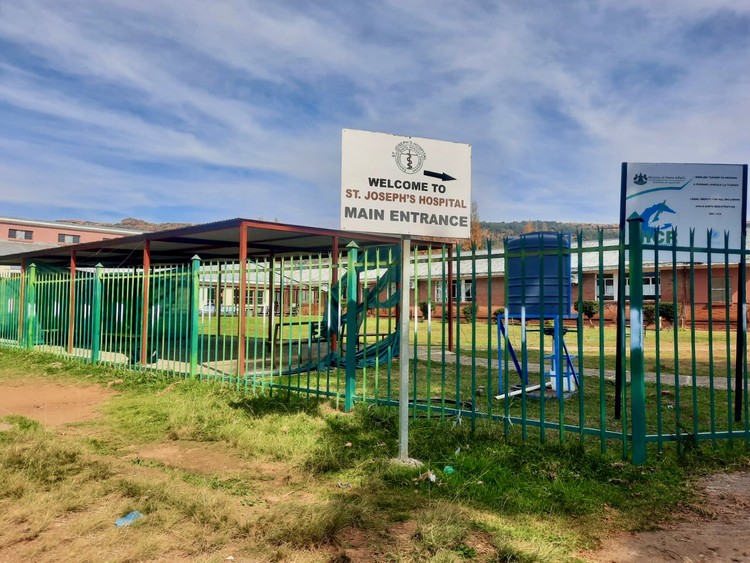
19 November 2025
St Joseph’s Hospital in Roma, Lesotho, provides HIV and TB care. It is owned by the Christian Health Association of Lesotho, who were represented at the US–Lesotho negotiations. Photo: Sechaba Mokhethi
A new five-year joint funding agreement between the United States and Lesotho promises to restore stability to a health system reeling from abrupt US aid cuts which led to the dismissal of hundreds of frontline workers and the shutdown of key HIV services.
In a statement on Tuesday, spokesperson for the US Embassy in Maseru Jessica Tesoriero said the new bilateral framework will secure “joint funding for frontline healthcare workers” and ensure continued procurement of essential HIV and public-health commodities.
The pact will also preserve the country’s disease-surveillance and data-monitoring systems, tools that nearly collapsed following the suspension of USAID and PEPFAR funds earlier this year.
Tesoriero said the memorandum of understanding, which builds on PEPFAR’s 18-year partnership in Lesotho that helped Lesotho achieve “remarkable results in the fight against HIV/AIDS”, is designed to move the country toward “a resilient, self-reliant, and durable health system” by combining US support with strengthened government ownership.
The agreement is to be signed in December, with implementation scheduled for April 2026.
The deal emerges from negotiations with a high-level US delegation led by Deputy Assistant Secretary for Health Policy and Diplomacy Mamadi Yilla. Senior officials from the US Department of Health and Human Services and the Centers for Disease Control and Prevention (CDC) also participated.
Lesotho Health Minister Selibe Mochoboroane and Acting Minister of Finance and Development Planning Ntoi Rapapa led Lesotho’s delegation. Faith-based organisations that provide life-saving care in Lesotho and representatives of The Global Fund also met the delegation.
Under the agreement, the US will provide technical assistance as Lesotho gradually assumes responsibility for managing core parts of its health system. This includes meeting a set of jointly agreed performance benchmarks.
The new pact follows months of turmoil triggered when US President Donald Trump signed executive orders suspending foreign aid for 90 days.
The move abruptly halted funding that supported around 1,500 health workers, including doctors, nurses, laboratory staff, and counsellors. The health ministry was unable to prevent mass dismissals.
UNAIDS reported that by March 2025, 72% of PEPFAR support had been paused or terminated, resulting in 804 job losses. By June, at least 652 frontline workers had been laid off, including 60% of the country’s HIV testing counsellors.
The funding collapse also slashed the health budget. Dr Tapiwa Turambiswa, who manages national HIV programmes, confirmed that 93% of USAID support and 6% of CDC funding had been cut, reducing total external assistance from roughly R1.4-billion to R600-million.
The consequences were immediate and severe. HIV testing numbers plunged from 11,702 in August 2024 to 9,054 in April 2025. Shortages of counsellors meant many tuberculosis patients, who are supposed to be tested for HIV, were no longer screened. (Lesotho’s TB incidence is among the world’s highest, at 664 cases per 100,000, and about half of patients also have HIV).
Prevention programmes were shuttered, including the M212-million (R1 = M1) USAID-funded SECURE project (condom distribution and medical male circumcision). The M168-million Bophelo Bo Botle programme, which supported more than 120,000 people on ARVs, was terminated.
Millions more were lost for mental-health support, primary healthcare, pharmacy regulation, and disease-surveillance systems.
Although Mochoboroane publicly maintained that Lesotho could survive with a funding gap of R181-million, the widespread service shutdowns and mass retrenchments revealed deep vulnerabilities.
Tesoriero said the new agreement marks a return to a collaborative model “anchored in shared responsibility”, with joint funding commitments and US technical support meant to ensure continuity of critical services while building long-term resilience.
For the thousands of Basotho who depend on HIV testing, treatment, TB screening, and primary healthcare, the agreement, though lacking in detail, offers the first signal of stability after months of uncertainty.